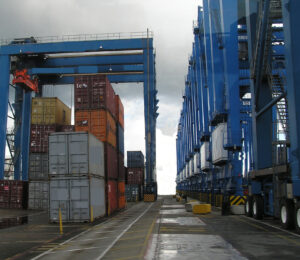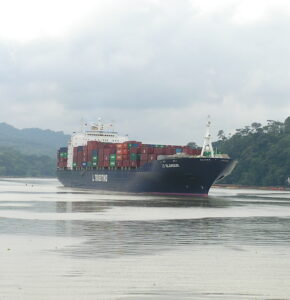Hot Potato! Weighing liability of Caribbean port operators
By Lowel Morgan *
There is, apparently, a great game of ‘hot potato’ being played in the shipping industry. It seems that liability for delayed, damaged or lost cargo is being tossed from player to player – each seeking to pass liability as quickly as possible to the next party. The players in this game are shippers, ship owners, carriers, stevedores, agents, and port/terminal operators.
The law has provided certain advantages to some players, allowing them to toss liability faster than others. Some players are even able to exclude their liability altogether through contractual arrangements (such as terms in bills of lading), domestic legislation, and international instruments.
Unfortunately, port operators and particularly those in the Caribbean, are more often burnt by the liability potato. They have very few sources of protection on which to rely. Why are port operators in this position? Do the instruments currently in force address these issues? And what is the way forward?
Contractual Arrangements
Port operators find themselves in a unique and challenging position. Port facilities are an essential service. They facilitate the execution of private contracts for the carriage of goods by sea. Under the ordinary application of the doctrine of ‘privity of contract’, a contract cannot confer rights or impose liabilities on an entity that is not party to it. Yet, port operators who are not parties to contracts between shippers, carriers, and agents often find themselves, on the one hand, exposed to all liabilities under the contract (and some liabilities outside of it as well); but, on the other hand, excluded from any of the benefits.
Port operators cannot, therefore, exercise any of the rights and privileges that come with being party to such contracts. This, of course, includes the right to contractually limit their liability for damaged or delayed cargo. This leads to a peculiar application of the doctrine of privity of contract as port operators are nonetheless exposed to the risk of contracts to which they are not a party.
While the simple and obvious solution would be for port and terminal operators to become party to the contracts, this is in effect impractical. No one can insert themselves into a contract negotiated by others for their common benefit. Similarly, port operators cannot simply insert themselves into a contract between the shippers, ship owners, carriers and agents. The port operator would essentially have to contract with each player. If contracting with every player is not feasible then the question arises: with whom to contract? The answer: All of them. This takes us back to square one.
Contract terms may provide for liability to be excluded altogether or limited (generally or in respect of certain causes of loss or damage). In performing the contract of carriage, a ship owner will usually employ persons or use the services of others as independent contractors (for example, stevedores to load and unload cargo) and the services of other sea, land, or air carriers. Ship owners will naturally seek protection from being held responsible by a charterer or bill of lading holder for any breach of contract or other defaults committed by employees, agents or independent contractors. And they may achieve this by entering contracts with, for example, an agent acting on behalf of the charterer or bill of lading holder.
Another commonly used device is the Himalaya clause. This is a term that seeks to ensure that any exemption and exceptions available to one of the parties to the contract is also available to his employees, agents and independent contractors. The Himalaya clause will: (i) contain a statement that no servant or agent of the carrier shall incur any liability to the shipper, consignee, owner of the goods or bill of lading holder for loss of or damage to the goods, and (ii) confer on the employee or contractor the right to rely on any exceptions or limitation provisions available to the carrier as set out in the contract of carriage or otherwise.
The extent to which port operators could benefit from Himalaya clauses is uncertain, as they may not be considered servants, agents or independent contractors of the carrier. In England, the Contracts (Rights of Third Parties) Act provides that a third party may avail itself of an exclusion or limitation of liability in a contract for the carriage of goods by sea where this is expressly provided for in the contract, or on a proper interpretation of the contract it appears that the parties intended that this protection should be extended to a third party. There is no equivalent statutory provision in jurisdictions such as Jamaica. Such a statute would prove mildly beneficial to port operators as on a proper interpretation of these contracts, protection would be extended to them as a third party.
Domestic Legislation

There is one legislative instance we would like to highlight which gives some limitation of liability to port operators in a specific circumstance. Section 410 of the Shipping Act of Jamaica provides that a dock or harbour authority may be liable for “any loss or damage caused to any vessel or to any property on board any vessel, without the actual fault or privity of such authority”. Similar sections exist in various pieces of legislation in the Caribbean and other Commonwealth countries.
The liability without actual fault refers to instances where it is the employees/servants of the port operator who cause the loss or damage being complained about. This principle of an employer being held liable for the acts of his employees is a feature of any employer/employee relationship. As such, legislative restriction of the employer’s liability is of great benefit to the port operator.
This protection is only available in a very limited number of instances and the port operator will need to show the following in order to receive its protection: (1) the damage occurred within an area under the control of the dock or harbour authority; and, (2) it was caused by their servants doing something connected to the operations/work/services of a dock or harbour authority.
Liability without privity takes us back to our earlier discussion of the contractual exclusion that port operators face and as such they are neither bound nor are they the beneficiaries of any limitations of liability or protection that these contracts may offer.
It is evident that port operators are, more often than not, going to be left holding the hot potato and getting burnt.
International Instruments
The international instruments have not adequately addressed the peculiar position concerning the liability of port operators. Most Caribbean nations adhere to the Hague Rules (Antigua & Barbuda, Aruba, The Bahamas, Bonaire, Dominica, Grenada, Jamaica, St. Kitts and Nevis, St. Lucia, Trinidad and Tobago). Others are party to the Hague-Visby Rules (British Virgin Islands, Cayman Islands, Montserrat and the Turks and Caicos Islands). Two have ratified the Hamburg Rules (Barbados and St Vincent and the Grenadines). However, as discussed below, these instruments may prove deficient for port operators. They do not necessarily extend to protect operators or apply to the period during which cargo may be within the control of port operators.
Hague Rules [1924 International Convention for the Unification of Certain Rules of Law relating to Bills of Lading] and Hague-Visby Rules [Brussels Protocol 1968 (Visby Amendment)]
The Hague Rules and Hague-Visby Rules focus primarily on establishing the minimum obligations of the carrier and defining the extent to which carriers can limit their liability. Both Rules leave port operators exposed to liability as they do not expressly address the responsibility of port operators, permit carriers and shippers to limit their liability for care of cargo at the port. In Article 1(e) of the Hague Rules and I(e) of the Hague-Visby Rules, ‘carriage of goods’ is defined as covering “the period from the time when the goods are loaded on to the time they are discharged from the ship.”
The carrier’s responsibility therefore runs from “tackle to tackle” – from the time when the ship’s tackle is hooked on at the loading port until the hook of the tackle is released at the port of discharge. To compound this issue, Article 7 of the Hague Rules and Article VII of the Hague-Visby Rules provide that carriers and shippers are free to negotiate their own terms in respect of the custody, care and handling of goods before loading and after discharge, and are well within their right to exclude their responsibility during this period. In other words, the carrier is free to exclude all liability for the cargo once it is not physically aboard his vessel. Thus, liability for cargo at the port is likely to fall squarely on the operator.
1978 United Nations Convention on the Carriage of Goods by Sea (“Hamburg Rules”)
Under the Hamburg Rules, carriers are liable for loss of or damage to goods in their charge, unless they can prove that all reasonable measures to avoid damage or loss were taken. One positive is that, unlike the Hague-Visby Rules, under Article 4(1) of the Hamburg Rules, the responsibility of the carrier for the goods “covers the period during which the carrier is in charge of the goods at the port of loading, during the carriage and at the port of discharge.” Additionally, Article 7(2) of the Hamburg Rules provides that, if an action is brought against a servant or agent of the carrier for loss, damage or delay of goods, that third party is “entitled to avail himself of the defences and limits of liability which the carrier is entitled to invoke” under the Rules. However, it is debatable whether this would automatically apply to port operators, as they are not servants of the carrier and would not necessarily be considered agents of the carrier under law.
1991 UN Convention on the Liability of Operators of Transport Terminals
The drafters of this convention attempted to address previous deficiencies by establishing uniform rules on liability for loss, damage, or delay in handling goods in the charge of operators of transport terminals.
In its explanatory note to the convention, the UN Commission on International Trade Law (UNCITRAL) noted the disparity in rules on the standard and limits of liability throughout various legal systems and intent to improve and harmonize liability rules, bearing in mind the legitimate interests of cargo owners, carriers and terminal operators. However, this convention did not receive sufficient ratifications to enter into force as it was only signed by France, Mexico, the Philippines, Spain, and the United States, and ratified by Egypt and Georgia.
Rotterdam Rules [Convention on Contracts for the International Carriage of Goods Wholly or Partly by Sea]
The Rotterdam Rules introduce the concept of “maritime performing party”, who is “subject to the obligations and liabilities imposed on the carrier” under Article 19 of the Convention and is “entitled to the carrier’s defences and limits of liability”, provided certain conditions are met. In particular, the occurrence that caused the loss, damage or delay must have taken place during the period between the arrival of the goods at the port of loading and their departure from the port of discharge. Additionally, the occurrence would have to take place either while the maritime performing party had custody of the goods or at any other time that it was performing activities contemplated by the contract of carriage. Terminal operators fall within the definition of maritime performing parties under the Rotterdam Rules, and may therefore be jointly and severally liable (along with the carrier) for cargo claims. There is however, the possibility that the terminal operators can seek an indemnity from the shipping line in respect of such liabilities. Note, however, that the Rotterdam Rules have not received sufficient ratifications to enter into force.
Terminal operators fall within the definition of maritime performing parties under the Rotterdam Rules and may therefore be jointly and severally liable (along with the carrier) for cargo claims. There is however, the possibility that the terminal operators can seek an indemnity from the shipping line in respect of such liabilities.
The way forward
Having established the insufficiencies of existing private, domestic and international options, we now look at the way forward. There are essentially two choices. Each country could set about drafting its own legislation and deal with shippers unilaterally. This will ultimately result in a multiplicity of rules and confusion for carriers and shippers and create an unattractive climate for investors.

The second (and better option) would be for Caribbean states to come together and enact the requisite policies as an organised bloc. Having a single instrument across the board has the following advantages. A unified, comprehensive set of rules on the liability of port operators will promote certainty, as carriers and shippers will know what to expect at each port. It would promote fair dealings, as shippers will not choose one port over another based on differing rules. It would result in more stable insurance risk profiles, which may be beneficial in negotiating annual premiums; and, would stimulate investment. Indeed, the introduction of legislation to bring certainty to this area would create a more stable environment for investment.
Port operators should be warned that no player likes to lose their advantage. Opposition to any move towards limiting the liability of port operators should be expected from shippers, carriers and agents. Shippers and agents would want to ensure that they are covered at every stage and would not want to increase their portion of liability.
Admittedly, the drafting and implementation of a Caribbean instrument is a long-term goal. Port operators are not without recourse however, as they can start to implement various internal measures in the interim to curtail their liability, and better regulate and manage potential liabilities. These measures include:
- removing control and operation of warehouse from the port operators to agents;
- drafting terms of use for the port facilities and defining what act qualifies as delivery to the agent;
- requiring ports to ensure shippers and consignees insure their goods;
- requiring agents to inspect condition of goods immediately as they reach the dock; and,
- ensuring their vigilance of their employees’ adherence to safety and operation policies.
As regards removing warehouse control and operation from port operators to agents, the port authority would maintain ownership of the physical property of the warehouse. However, a contractual arrangement between the port authority and the relevant agent would remove its liability for care of cargo within the warehouse. Agents would be responsible for ensuring the goods in their care are adequately secured and required to indemnify the port operator. Such an arrangement may require physical restructuring of the port. As regards removing warehouse control and operation from port operators to agents, the port authority would maintain ownership of the physical property of the warehouse. However, a contractual arrangement between the port authority and the relevant agent would remove its liability for care of cargo within the warehouse. Agents would be responsible for ensuring the goods in their care are adequately secured and required to indemnify the port operator. Such an arrangement may require physical restructuring of the port. []
 Lowel G. Morgan, BSc., LLB, LLM (Maritime Law), FCIArb. is Managing Partner of the Jamaican law firm Nunes, Scholefield, DeLeon &Co and lead Attorney in the firm’s Admiralty & Maritime Practice Group, which includes Stephanie E. Forte, LLB, LLM (International Law); Gabrielle R. M. Hosin, BSc., LLB and, Arlene A. Williams, BSc., LLB., all of whom collaborated for this article, assisted by Darwin Telemaque of Antigua.
Lowel G. Morgan, BSc., LLB, LLM (Maritime Law), FCIArb. is Managing Partner of the Jamaican law firm Nunes, Scholefield, DeLeon &Co and lead Attorney in the firm’s Admiralty & Maritime Practice Group, which includes Stephanie E. Forte, LLB, LLM (International Law); Gabrielle R. M. Hosin, BSc., LLB and, Arlene A. Williams, BSc., LLB., all of whom collaborated for this article, assisted by Darwin Telemaque of Antigua.
- First published 2015 June 1.





